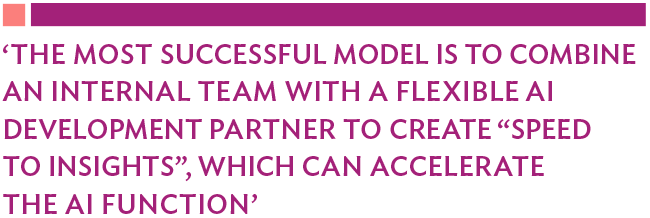Q: Please demystify artificial intelligence
A: AI has many different descriptions, depending on whom you talk to or reference. In layman’s terms, AI is the combination of data, computational machine learning and algorithms. There are many different techniques, equations and engineering languages that can be used to develop an AI model or asset.
AI is not new but it has been popularised and democratised over the past 10 years with the advent of more powerful, flexible and more affordable computing platforms, especially cloud computing.
There are essentially three major AI categories: cognitive AI, which attempts to re-engineer the way humans think, talk and act; robotics AI, which automates or enables robotics, robots or processes; and data AI, which automates the processing and analysis of large amounts of data to identify outputs such as trends and/or future predictions.
Genii AI is focused on the latter. We predict consumer behaviour based on historical data and social human-behavioural sciences. We develop robust AI models by leveraging natural language processing, text analytics and machine-learning on prediction modelling platforms such as Google, AWS and Azure.
Q: In what way do predictive analytics complement AI?
A: There are three types of analytics: descriptive (as in, what is happening); predictive (what is going to happen); and prescriptive (how to use the analysis proactively).
Genii is largely concerned with predictive analytics, for example when the outputs of the AI model predict the future behaviour of customers, which is largely determined by historical behaviour and data and social sciences.
Without blinding you with the science, in the example above, historical data fed into a pre-developed machine-learning platform coded with algorithms looks for patterns, associations, and correlations in order to predict outcomes. A data scientist will use different techniques and algorithms to improve accuracy of the outputs.
Q: How fast is the AI industry growing, and who is leading its development?
A: AI is probably one of the most topical boardroom discussions in the modern business era. It’s debated globally that the Fourth Industrial Revolution is already in progress and, as many leaders will testify, AI is going to change the way we live and how we do business.
The global race for AI dominance is led by countries such as China and the US, which collectively spend billions of dollars on AI R&D, and companies, such as Google, Amazon and Microsoft, that want to lead the innovation.
From an international perspective, SA may be considered a small country, yet it is well positioned to avail itself of a reasonable percentage of the global market share as an exporter of AI innovation. Genii AI is already exporting innovation from SA in partnership with large global technology companies Genesys and Amazon Connect.
The International Development Corporation (IDC) forecasts that AI revenues will grow from $8 billion in the US alone to $47 billion in the next few years. It also predicts that the market for big data technology and services will grow at a 23.1% compound growth rate, reaching $48.6 billion this year. Next year, the IDC says, 50% of all business analytics software will include prescriptive analytics, and embedded data analytics will provide US enterprises with $60 billion in annual savings.
However, it must be considered that many companies do not yet have an AI strategy, or remain unconvinced of the benefits. I have no doubt that when AI companies start delivering more and more successful solutions that demonstrate AI value, these figures will escalate.
Q: How can companies use AI and predictive analytics to their advantage?
A: Research undertaken by Forbes shows that AI will improve productivity by 40%; reduce operating costs by 28%; improve speed-to-market by 21%; and transform business and operating models by 20%.
Over the past five years, however, Genii has assisted B2C Top 500 companies in the financial services, telco, healthcare, insurance, automotive and retail sectors to achieve other business benefits, including improvements to customer service, sales and customer retention.
This is achieved by using our AI prediction model, which is able to identify future customer service needs and customer interactions. The output data presents a list of the ‘who, why and when’ customers will require a service, enabling a company to be proactive in anticipation, thus reducing high-volume customer phone-ins to the call centres. This results in massive cost savings while simultaneously improving customer satisfaction and brand reputation.
Another AI model predicts customer churn – when it is likely a customer will no longer support the brand or service, and why. The company is therefore empowered to immediately react to resolve customer issues. Historically this aspect of customer service impacts on return-on-investment in the multimillions of rands.
Q: If AI is really all about data, how should companies be managing it?
A: Nowadays, companies collect enormous amounts of customer data, but across different data sources. It is loosely said in the market that ‘data is the new oil’. Companies that can leverage customer data for ethical ‘consumer good’ will benefit significantly. However, regulations around the ethical use of consumer data will have a big impact on the application of AI, especially when collecting and using consumer data without consent.
Data security is part of this regulatory environment and has thus become an imperative for all companies, large or small. Being able to secure the data, as well as manage it properly, includes being able to delete customer data effectively either as per regulation or at a customer’s request.
It also means handling data with extreme caution to ensure not just security but privacy and ethical application too. Regulation and consumer breaches are something even large global companies struggle with, so it’s not surprising that all aspects of data security feature very high on the strategic agenda of operations.
Q: Why should data be collected at all?
A: AI feeds off data and, in some cases, in large quantities, but it does depend on the AI model being adopted.
Different AI models need different data sets. Data engineering for AI in most cases is more time consuming than developing the actual algorithms that drive it. So although data access can be a barrier to AI, it is becoming less of a barrier with the advent of automated machine learning. We now have algorithms that could prepare data better to reduce human effort.
Q: Is all data valuable, or are there superfluous quantities that can be disregarded for AI application?
A: In order to enable AI and prediction analytics, companies need to have the correct data to feed the platforms. It is also critical to develop a business case or ‘reason’ for the AI platform before designing the data blueprint that defines what data is required to ultimately deliver the required outputs. This encompasses the use of structured and unstructured data to allow for predictions on future consumer behaviours. The data must, at least, include historical customer information during a defined period, for example, POS, CRM, billing and interactions.
While both structured and unstructured data is required to mature a specific prediction model, in some cases the unstructured data is not required. However there are instances when large amounts of ‘superfluous’ data is essential to create ‘noise’, which makes the outputs more accurate. Genii, for example, will use customer interaction, CRM and billing data to predict future customer churn.
Q: Is there value in creating internal data hubs or data-science teams?
A: Most companies will establish an internal data management or data engineering/science capability for the future application of AI. What we have found though is that the most successful model is to combine an internal team with a flexible AI development partner to create ‘speed to insights’, which can accelerate the AI function.
This is enabled by what we call ‘speedboats’ that can extract very specific data from larger data sources or ‘data tankers’ supplied by the internal data hub.
Q: Will AI replace the role of humans in the job market?
A: AI will definitely have an impact on future jobs. However it’s not necessarily true that AI will take away jobs; rather it changes the future workforce by creating different jobs.
It’s also not about man versus machine, but rather man and machine working together, which will be the most effective solution. We refer to it as co-botics. In certain applications, AI will assist humans to work faster and more accurately.











